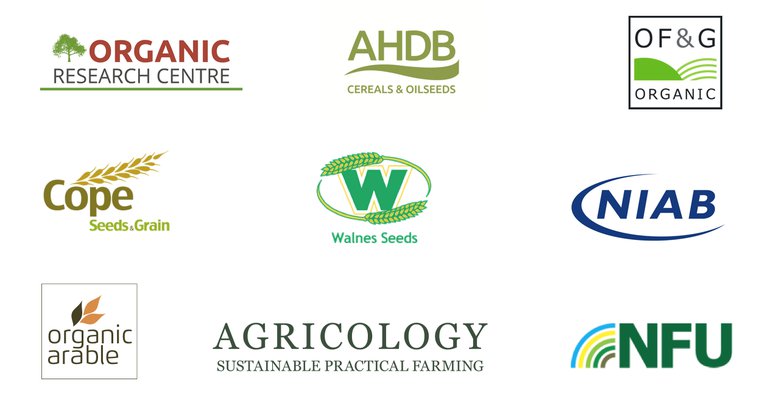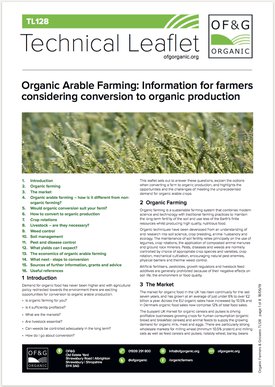
OF&G National Organic Combinable Crops 2020 #NOCC20
Online
9th June 2020
- Virtual NOCC -
| Click for Dates & Times |
OF&G National Organic Combinable Crops 2020 was due to take place at John Pawsey’s Shimpling Park Farm in Suffolk on 7 July.
However, in light of the Government‘s recent announcement to extend COVID-19 restrictions and given the likelihood that we will not see a sudden return to full freedom of travel for some time we have decided that our planned annual gathering of 200+ people in a barn and a marquee in July 2020 will now not go ahead.
Instead, we are planning to gather digitally this year and we will revert to NOCC in its more traditional form next year, again at John Pawsey’s.
OF&G’s National Organic Combinable Crops is the largest organic farm event and one of the longest running farm conferences to be held in the UK.
Working with our partners we will be presenting a series of online events. We are grateful for support from the teams at Agricology, NIAB, the Organic Research Centre (ORC) and the Processors and Growers Research Organisation (PGRO) with support from the Agricultural and Horticultural Development Board (AHDB) and the National Farmers Union (NFU).
We are very pleased to announce that the renowned journalist and broadcaster Charlotte Smith will again be chairing the NOCC discussion panel sessions.
Charlotte (who posts personal comment via Twitter @charlottebsmith) is very well known for her professionalism as an articulate food and farming broadcaster even in the midst of heavy weather as many of us who listen to her brilliant reports from fields all round the United Kingdom on BBC Radio 4's Farming Today, know full well.
With videos of crops on the farm, conversations with leading practitioners, and discussions to be led by the NOCC chair, Charlotte Smith we will present insight and knowledge from successful food and farming businesses.
Highlights will include –
· No-till and min-till, involving both organic and non-organic methodologies and practice.
· New approaches to land management schemes and a look at what we can expect to see as the UK moves out of the sphere of the European CAP.
· Environmental input/output measurement systems – investigating tools now in use such as Agrecalc, Cool Farm, and FCCT.
· New food business – how do we transition some of the food and farming economy in light of climate and further possible pandemic crisis.
Our host this year, John Pawsey, will be digitally welcoming us all to his wonderful mixed farm in the East of England.
We will demonstrate and discuss the work John and others are doing to help bring food systems onto a more resilient and stable footing, better able to withstand ecological and economic shocks.
Along with John and the crops research team at the ORC we will be joined by Clive Bailye of the Farming Forum and Direct Driller magazine, organic farmer and director at Organic Arable, Mark Lea, Roger Vickers of PGRO, Liz Stockdale and Phil Howell, of NIAB, agro-ecological mixed farmer and blogger, George Young and Lawrence Morden of Walnes Seeds with more details to be announced here very soon.
Tickets already booked for the original event that was to be held on 7 July will be refunded.

| Dates and times |
OF&G and AHDB webinar
Seeds and deeds: collective plant breeding for reduced input farming
· 9 June 2020, 9am-10.30am
· To register, visit https://register.gotowebinar.com/register/2215183184627372558
· Steven Jacobs, business development manager at OF&G
· Dr Ambrogio Costanzo, principal crops researcher at ORC
· Emily Pope, Knowledge Exchange at AHDB
· Dr Phil Howell, head of cereals at NIAB
· Mark Lea, organic farmer at Green Acres Farm, Shropshire
A recording of this webinar is now available - Seeds & Deeds
NFU virtual organic farm walk
Challenges of net zero
· 23 June 2020, 1pm-3pm
· To register, visit https://www.nfuonline.com/sectors/crops/crops-news/virtual-organic-farm-walk-challenges-of-net-zero/
· John Pawsey, organic farmer at Shimpling Park Farm, Suffolk
OF&G and AHDB webinar
Know your soils and know your sales: organic min-till and non-organic no-till
· 7 July 2020, 9am-10.30am
· To register, visit https://register.gotowebinar.com/register/1166654811408057356
· Charlotte Smith, journalist and broadcaster
· John Pawsey, min-till, organic grower and NFU Organic Forum chairman
· Clive Bailye, no-till specialist and founder of The Farming Forum and Direct Driller Magazine
A recording of this webinar is now available as a podcast - Know Your Soils and Know Your Sales
OF&G and Agricology webinar
Land sharing and sparing - a conversation on the value of agroecological food production systems
· 14 July 2020, time 17.00-18.30
· To register, visit - https://www.eventbrite.co.uk/e/land-sharing-and-land-sparing-a-conversation-on-agroecological-production-tickets-109812389814
· Charlotte Smith, journalist and broadcaster
· Roger Kerr, chief executive at OF&G
· Sue Pritchard, chief executive at the Food, Farming and Countryside Commission
· Dr Bruce Pearce, director at the ORC
· Vicki Hird, campaign coordinator at Sustain
A podcast recording of this webinar is available online
The OF&G report on the land use models of sharing or sparing is available online.
..
And we will be bringing more content online, with more details announced here very soon.
..
NOCC is a collaborative enterprise with OF&G working alongside Agricology, the AHDB, Cope Seeds, NIAB, the NFU, Organic Arable, the Organic Research Centre and Walnes Seeds.

...
Organic champion John Pawsey (on Twitter as @hanslope) is a fourth-generation farmer based in Suffolk, where he tends 650 hectares of arable land and rears 500 New Zealand Romney sheep. John is also responsible for managing an additional 850 hectares for neighbouring farmers. All of the farms are managed organically.
| John Pawsey's crop rotation is detailed along with an organic and non-organic gross margin comparison in the OF&G arable technical guide which is available to download - TL128 Organic Arable Farming |
Here John, in his own words, speaks about his experience of becoming an organic farmer -
Shimpling is an arable farm just outside Bury St Edmunds which has been in our family for over 100 years. Part of the farm is a former airfield built in 1943 on land bought by my maternal great grandfather in 1904, so there’s a lot of history here.

In 1999, I converted the farm to organic production because I was concerned about overworked soils and diminishing biodiversity.
How was the process of getting certified?
Exciting and educational! The process takes you through the whole ethos of organic farming. Don’t be scared of certification – it’s part of the learning curve. If you’re doing it for the right reasons, it’s common sense, and why wouldn’t you want to do it?
What are the challenges of becoming organic?
Fertility and weed control are the major challenges.
We’ve made lots of changes in the last five years to make our system more robust, every aspect of it, from fertility to rotations to marketing. We have a more robust farming system as a result and it’s obviously working because I can sell it. We are converting more farmers to organic than ever before and they have more confidence in what we are doing.
I feel very positive for the future – I think the market is growing and I think we are going to be ahead of the curve.
How has being certified organic benefitted you?
First and foremost, it has significantly improved the health of the soil – meaning we will leave it in good condition for future generations and have a positive effect on biodiversity.
Secondly, it gives me a price premium. As well as benefiting the land, we quickly found that farming organically meant we were better off financially.
The other thing that’s been fantastic is the connection with the market. With conventional farming, I had no idea what was happening to our grains. I had no idea if it was going to end up in this country, feeding pigs or people. But we now know where every grain goes, and what product it goes in to, so that connection to the market for me is a real bonus.
The above is taken from the OF&G series of Case Studies -
https://ofgorganic.org/case-studies/being-certified-organic-has-benefitted-our-land-and-our-finances
_

John Pawsey's crop rotation is covered in detail along with a gross margin comparison of his farm business from before he converted to organic through to the present day.
The OF&G arable technical guide is available to download -
TL128 Organic Arable Farming
-

..
The OF&G NOCC19 report is available online - Bred for organic
..
..
..
..
..
| Back to top |
